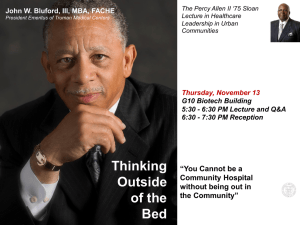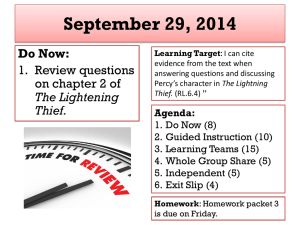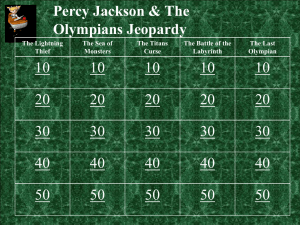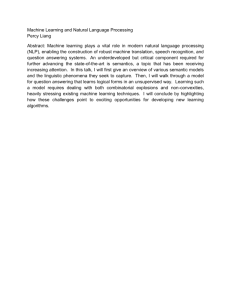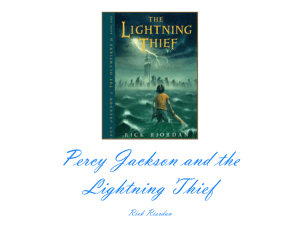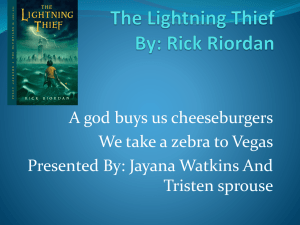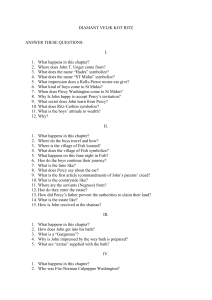The Lightening Thief Concept/Vocabulary Analysis Summary
advertisement
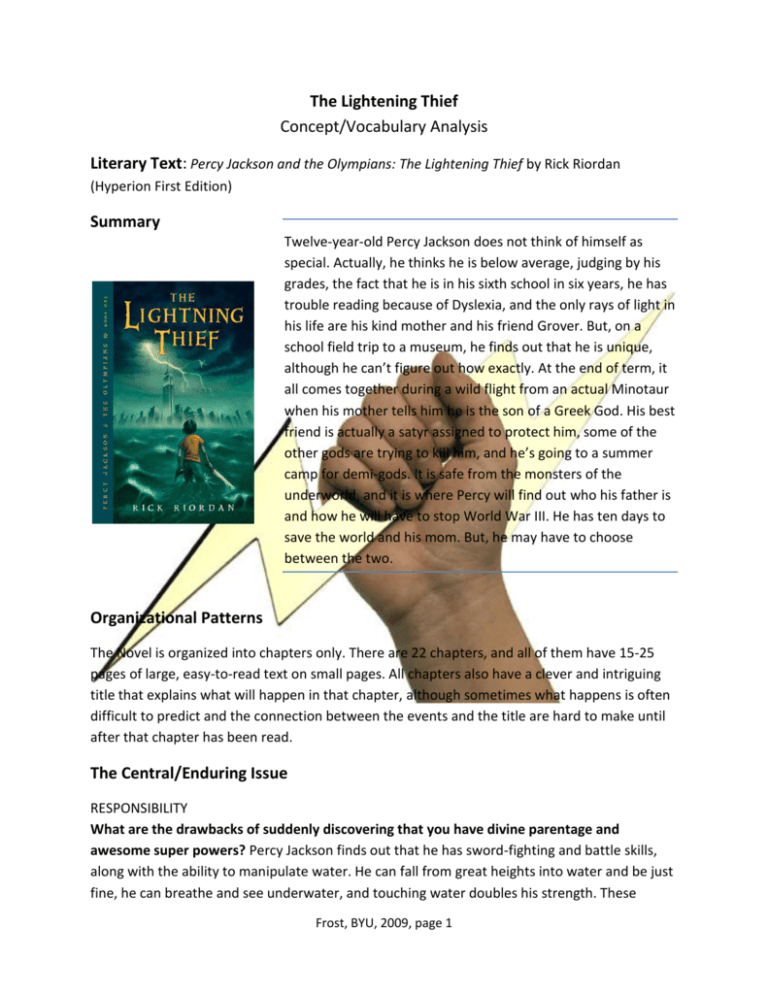
The Lightening Thief Concept/Vocabulary Analysis Literary Text: Percy Jackson and the Olympians: The Lightening Thief by Rick Riordan (Hyperion First Edition) Summary Twelve-year-old Percy Jackson does not think of himself as special. Actually, he thinks he is below average, judging by his grades, the fact that he is in his sixth school in six years, he has trouble reading because of Dyslexia, and the only rays of light in his life are his kind mother and his friend Grover. But, on a school field trip to a museum, he finds out that he is unique, although he can’t figure out how exactly. At the end of term, it all comes together during a wild flight from an actual Minotaur when his mother tells him he is the son of a Greek God. His best friend is actually a satyr assigned to protect him, some of the other gods are trying to kill him, and he’s going to a summer camp for demi-gods. It is safe from the monsters of the underworld, and it is where Percy will find out who his father is and how he will have to stop World War III. He has ten days to save the world and his mom. But, he may have to choose between the two. Organizational Patterns The Novel is organized into chapters only. There are 22 chapters, and all of them have 15-25 pages of large, easy-to-read text on small pages. All chapters also have a clever and intriguing title that explains what will happen in that chapter, although sometimes what happens is often difficult to predict and the connection between the events and the title are hard to make until after that chapter has been read. The Central/Enduring Issue RESPONSIBILITY What are the drawbacks of suddenly discovering that you have divine parentage and awesome super powers? Percy Jackson finds out that he has sword-fighting and battle skills, along with the ability to manipulate water. He can fall from great heights into water and be just fine, he can breathe and see underwater, and touching water doubles his strength. These Frost, BYU, 2009, page 1 powers and abilities are all incredibly cool to talk about just to know that he has, but they also come with a He now has to choose how he will use them, and to end. These powers come with amazing responsibility because what he chooses to do with them can affect entire human race. In fact, Percy is asked to choose between saving Western Civilization or his own mother. hero, he does not have the freedom to make choices in same way because so many people are depending on Sometimes he has to choose between what he wants than anything and what he knows is right. or price. what the As a the him. more IDENTITY Would Percy really prefer to remain in the dark about who he is and where he comes from? Often throughout the book, Percy seems to wish that he could go on being a normal boy who does not have to have the responsibilities of protecting people. He seems to wish he never would have found out who his dad is, or what that means for him. But, it answers so many questions about why he has ADHD and Dyslexia, why odd things seem to happen to him, no matter where he goes, and why he feels like life as a normal kid is not enough for him. Would he really choose, if he could, to give up knowing who he really is and why he is the way he is? What kinds of things are important to know about oneself and why? What can our roots tell us about who we are today? Issues Related to this Study of Literature THEME Things are not always what they seem- One of the major themes of Percy Jackson and the Olympians: The Lightening Thief by Rick Riordan is the concept of meaning in life, and how life is surprising sometimes. Percy thinks that he is simply below average in school because he has disorders such as ADHD and Dyslexia, but he finds out that these disorders actually stem from a battle sense and restlessness as well as a tendency to want to change modern English into Ancient Greek when he reads. He is actually above average in a number of ways, and people depend on his powers and skills for their lives and their protection. Modern science has explained many different phenomena, but Percy finds out that New York is the home of Mount Olympus, which is suspended above the Empire State building, and Los Angeles, California holds the entrance to Hades’ realm, the underworld. People do not see it because of the Midst; they see what they choose to see instead, what makes sense to them. How many times do we walk by a real life situation, and see it in a different way because that is what we understand? People Frost, BYU, 2009, page 2 have a tendency to use what they know to explain the unknown. Does that make it true? Just because science says something right now, does that make it the only correct way to look at the world? Science has supposedly explained weather patterns, but Percy finds out that the Ancient Greek Gods truly control them. And yet people still fit their own explanation in and make it truth to them. The important part of this theme is to point out that the most marvelous discoveries were made by people who insisted on thinking differently, to explain the unknown in a new way. SETTING The Lightening Thief takes place in a number of major cities spread across the United States. The main character starts out in a boarding school in New York City called Yancy Academy, about fifty miles from Hudson Valley. He gets to go home at the end of term to a small apartment building on the Upper East Side of New York City. His mother takes him on a short trip to Montauk beach to vacation in a cabin there, until he is chased into hiding at Camp HalfBlood. Camp Half Blood is located outside of New York City, disguised as a strawberry farm. There are woods surrounding the camp and it has twelve cabins, each one for the children of a specific god or goddess. He then travels west to Los Angeles, passing through St. Louis, Denver, and Las Vegas, and stopping at Santa Monica Beach before braving the city of Los Angeles. The book finishes back in New York City, where Mount Olympus is located for now. CONFLICT Frost, BYU, 2009, page 3 Internal: Percy has many internal conflicts throughout the novel. One of the main conflicts is with his own reaction to finding out who his father is. He feels angry at his father for letting him live in ignorance. Because his father is so powerful, Percy wonders why he does not simply protect Percy and make it easy for him. Percy was also not supposed to be born. The three main Gods, Zeus, Poseidon, and Hades, all made a pact after World War II that they would not have any more children by mortals. Percy was a great big oops. His birth was a mistake; his father did not want him to be born, and his very existence creates momentous problems and blame on his father. Percy must learn to live with the fact that he is a mistake. And he needs to decide if he will simply turn his back on a father who has never even taken the time to show that he cares or if he will live his life trying to make his father proud of him and accepting whatever help and contact his father chooses to bestow. Percy also must choose between what he wants most (his mother to come back to life) or the right thing to do (save all of his friends and all of civilization from a devastating World War III. Both choices are good and ethical, but it is a lot of responsibility on his shoulders in return for knowledge that he did not even want in the first place. External: Because Percy Jackson is the son of a God, mythological monsters are constantly following him, tracking him, and making attempts on his life. The more he knows about the danger he is in, the stronger his scent becomes. When Percy’s father claims Percy as his son, the danger increases because he is now a forbidden child of one of the Big Three Gods. Throughout the book, he encounters many different kinds of fighting. He fights his math teacher, who turns out to be one of the three Furies. He also must fight a Minotaur, a battle in which he loses his mother. He encounters a Chimera, Medusa herself, a number of other monsters, and in the end he must fight the War God, Ares. He receives injuries, goes without food and sleep, and pushes himself to his physical limits throughout the plot. POINT OF VIEW, NARRATIVE VOICE The novel is a first person narrative told by Percy Jackson, as if he was speaking conversationally to the reader. He does not speak with arrogance about his powers or his birthright. He actually states them as problems that you certainly would not wish upon yourself. He speaks very honestly as a teenage boy, pointing out his own weaknesses more readily than he points out his strengths. Frost, BYU, 2009, page 4 Percy describes himself as the unlucky recipient of some extremely life-altering information, and he warns the reader to believe that it is all fake, that none of it could really happen. And if the reader has a life like the one Percy started with in the beginning of his telling of the story, Percy warns the reader to continue believing that it is all made up by an author sitting at a typewriter somewhere, writing the story for fun and pleasure. Percy remains cynical throughout the novel, pointing out that he, like us, tries to look at the good in situations. But he, unlike us, is a half-blood and bad things seem to happen to him. He seems annoyed, almost attempting to make his bad luck humorous, and constantly surprised that he was not able to foresee bad things that seem to always happen to him, describing himself as a magnet to which bad luck seems to be drawn. Affective Issues Related to the Work Students will be able to relate to Percy and the other characters throughout the novel on a variety of levels and in diverse and individualized ways. First, the question of saving a loved one at the expense of the lives of many. While it is very unlikely that any students have encountered this decision, it is an opportunity for them to explore themselves and their own strengths, beliefs, ideals, and ethical priorities. Students reading Percy Jackson and the Olympians: The Lightning Thief will also be able to explore the issue of identity. Some students may not know who both of their parents are. Would they want to know if they could? What if they were disappointed? What kind of knowledge about ourselves do we take for granted? Many people do not have baby pictures of themselves, or stories about their parents or their childhood. What can these things tell us about ourselves? What tendencies do you have that might be related to your heritage? Also, Percy is not sure how he feels about his quest’s companion, Annabeth. He does not truly get along with her at first, but seems to like her more as the quest goes on, even become attracted to her. Students will be able to relate to a developing crush and how it affects behavior. By the end of the book, Percy considers Annabeth to be a friend worth sacrificing for. What kinds of things can change your mind about someone? What kinds of first impressions have you had that turned out to change the more you got to know someone? Also, there is the bully at Camp, Clarisse. Students will be able to relate to the idea of someone stronger and meaner who tries to push Percy around. But, Percy is able to save himself from a swirly using his newfound powers. In what kinds of everyday bullying situations would powers Frost, BYU, 2009, page 5 like this be handy? Students can relate to the desire to thwart authority that is established because of size and backup, just like bullies in schools. There is also an underlying theme of morality and adultery. The Gods and Goddesses of Mount Olympus often have backgrounds involving immorality and adultery. Sometimes it is punished and sometimes it is not. Some students may have differing beliefs and tolerances regarding morality and adultery, and it may be a tricky subject throughout the book that could generate opinion-based discussion. Vocabulary Issues The Raygor Readability Estimate yielded an estimated 6th grade reading level for Percy Jackson and the Olympians: The Lightning Thief. It is written in very basic language with all students should be familiar, as it is more conversational than academic. However, there are some issues that could be a problem throughout the work as related to the mythological terms, characters, and language. It might be a good idea to familiarize students with a number of the Ancient Greek Gods and few of their stories and relationships, along with a few monster terms such as Fury, Medusa, Chimera, and Minotaur, just so that the students can have prior knowledge and connections to these ideas and concepts. Background Knowledge As stated above, there are some issues that could be a problem throughout the work as related to the mythological terms, characters, and language. Students can enjoy the novel without this knowledge, as it often gives short descriptions of character and monsters, but some jokes would be hard to understand, some characters would be difficult to picture, and some deep situations might be missed without giving students prior background knowledge into Ancient Greek Mythology. Some things that they may want to know more about for insight and connection to the mythological themes would be: Zeus: God of Sky. Defeated Titans with a Lightening bolt, which is his preferred weapon. Poseidon: God of Sea. Created horses. Brother of Zeus. Hades: God of Underworld. Brother of Zeus. Resents his position and its responsibilities. Things in the underworld (River Styx, Ferrier, three-headed dog, Persephone, the Furies) The Fates and any other creatures: what they do/ look like Frost, BYU, 2009, page 6 Ares: God of War, has an affair with Aphrodite, Goddess of Love, who is married to Hephaestus, who is always trying to catch them and embarrass them in their affair (depending on community context, this story could be told in a watered-down fashion using children’s versions). There are a number of picture books with quick stories to read them. Focus particularly on the gods vs. Titans myth. Other terms and names to consider: Gallery Frieze Quest Minotaur Satyr Nymph Centaur Dionysus Demeter Aphrodite Hephaestus Apollo Hermes Athena Hera Chiron Oracle Fates Furies Hydra Orpheus Cerberus River Styx Olympics Persephone Chimera Echidna Ichor Kronos Tartarus Titans Muses Implications for Student Diversity Percy Jackson and The Olympians: The Lightning Thief has little to no mention of ethnic diversity. There are a few references to diversity as it relates to socioeconomic class. For instance, Percy does feel slightly uncomfortable in a scene where some upper-city kids discuss their summer vacation plans and Percy is simply going back to his d own-town New York apartment. This could generate a discussion about class as it fits in modern society in the United States, and if class differences really mean anything in terms of importance or distinction. Even though Percy comes from a home where the mother has two jobs simply to get by in their small apartment, he turns out to be the son of a God, with super powers and skills. Does money make someone better, or is it the means to attain it? Gender Issues Percy Jackson and the Olympians: The Lightning Thief does not deal with Frost, BYU, 2009, page 7 any particular gender issues. One incident does come up with Annabeth’s parentage. She is the daughter or the Goddess Athena, and she tells Percy how she was expected to live with her father, not with her mother, because he was mortal. Her father, however, thought it more prudent for a daughter to grow up with her mother so this created a conflict, making Annabeth feel unwanted between the two. However, girl half-bloods are considered just as capable as the boys, and are treated equally in training and in battle. Project Ideas Venn DiagramHave students compare and contrast one mythological character of their choice from the novel to the same character from other myths that we have read as a class, or myths that they encounter on their own. Design your own Olympus ProjectWhere would it be? What would it look like? Have students come up with a written description and/or a visual that describes their own Olympus with explanations and rationale, using imagery and colorful, creative ideas. Reader’s TheatreDivide students into groups and ask them all to choose one of the scenes from the novel that involves battle. Have them assign a character or narrator to each person in the group, and to interpret that battle scene in a skit. They can come up with visuals, costumes, and any other visual effects that they think would be helpful to their interpretation of that particular scene from the novel. They also need to type up their own script and hand this in. Enrichment Resources Classic Myths to Read Aloud as edited and compiled by William F. Russell- Frost, BYU, 2009, page 8 This book has a number of the main stories of Greek Mythology that are arranged specially for children five and up by an educational expert. This would be a perfect resource to help students to become more familiar with the mythological history, characters, and terms that recur throughout the novel. Disney’s “Hercules”This movie is not entirely accurate as compared with actual Greek Mythology, but it would be a great resource that would create a visual for students in regards to some of the characters, terms and places that will be encountered throughout the story in Percy Jackson and the Olympians: The Lightning Thief, told about another demi-god of different parentage. It could be used simply in small segments to demonstrate particular relationships or to introduce particular characters to the minds of the students. The Classic Treasury of Bulfinche’s Mythology as Edited and Compiled by Thomas BulfinchThis is a children’s picture book contains stories involving many characters and relationships that come up throughout the novel, such as the story of Orpheus and Eurydice, much like when Percy attempts to go to the underworld and return his mother to life. There are also stories about Medusa, the Chimera, Hercules, the Trojan War, and many others. This book has beautiful illustrations that can help the students to make visual as well as auditory connections to the novel. Frost, BYU, 2009, page 9

